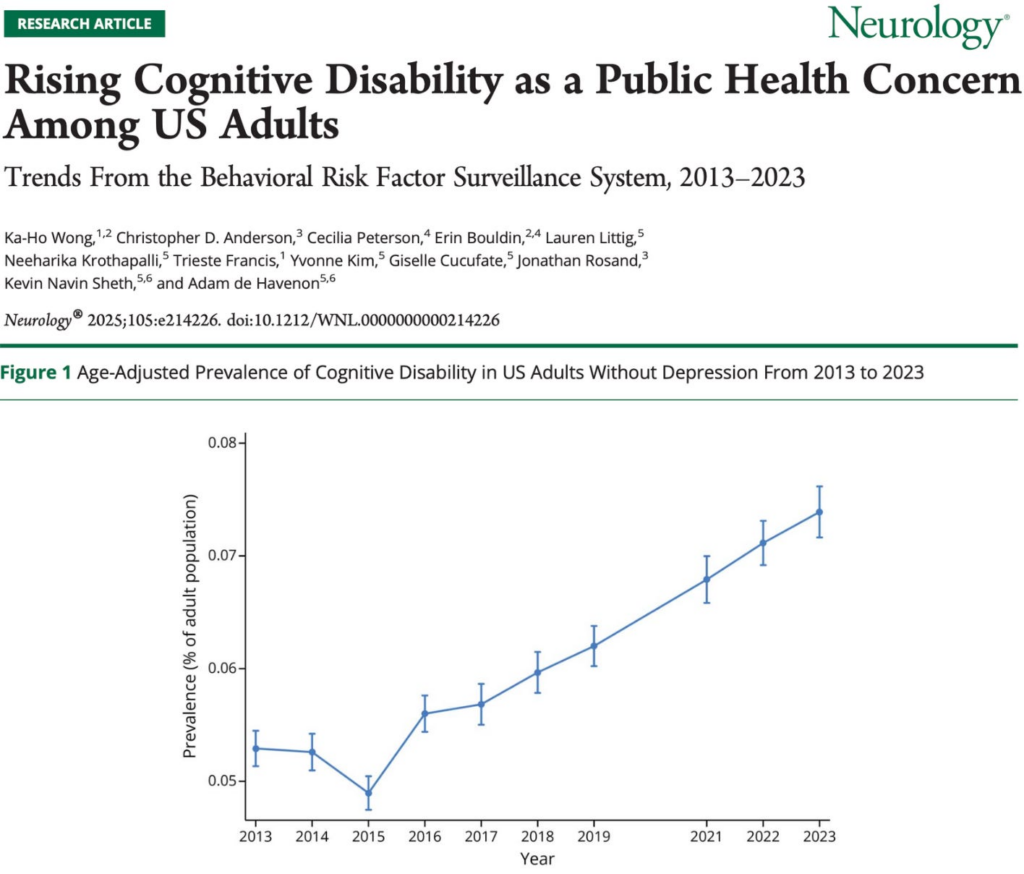🔴 Website 👉 https://u-s-news.com/
Telegram 👉 https://t.me/usnewscom_channel
A major new Neurology study analyzing more than 4.5 million U.S. adults has uncovered a striking trend: self-reported cognitive disability—difficulty concentrating, remembering, or making decisions—has surged by 40% over the past decade.
According to CDC Behavioral Risk Factor Surveillance System (BRFSS) data, prevalence rose from 5.3% in 2013 to 7.4% in 2023, marking the sharpest increase ever recorded.
Even just since 2019, rates climbed from roughly 6.4% to 7.4% nationwide—a 16% jump in only four years. The most dramatic rise occurred among younger adults aged 18–39, where rates nearly doubled, from 5.1% to 9.7%. This climb began around 2016 and continued steadily through 2023, with no signs of stopping.
The implications stretch far beyond neurology clinics. The collapse in sustained attention, logical reasoning, and decision making abilities now pervades public discourse, workplaces, and relationships.
And two emerging accelerants are likely pouring gasoline on this already burning fire:
Neurotoxic Mass “Vaccination”
A nationwide South Korean cohort study by Roh et al analyzed over 558,000 adults aged 65 and older. It found that recipients of COVID-19 mRNA injections faced a markedly higher risk of developing cognitive disorders within three months:
-
Mild Cognitive Impairment (MCI): 138% higher risk (OR 2.38; 95 % CI 1.85–3.06)
-
Alzheimer’s disease: 23% higher risk (OR 1.23; 95 % CI 1.03–1.46)
Thorp et al identified 86 serious neuropsychiatric disorders linked to COVID-19 vaccination — including cognitive impairment, dementia, schizophrenia, suicidal & homicidal thoughts, stroke, psychosis, depression, delusions & more.
Given that over 80% of the global population has received these injections, there’s expected to be an enormous population burden of new or accelerated cognitive decline.
Widespread Artificial Intelligence Use
A recent MIT neurocognitive study—Your Brain on ChatGPT: Accumulation of Cognitive Debt when Using an AI Assistant for Essay Writing—shows that reliance on large language models like Grok, ChatGPT, and Gemini leads to measurable and lasting neural suppression.
EEG brain scans revealed weakened neural connectivity, reduced memory recall, and a persistent drop in brain activity even after participants stopped using AI.
By Session 4, when students attempted to write without assistance, their brains remained underactivated—unable to re-engage their own executive and creative circuits.
The authors warn that this “cognitive offloading” creates long-term neural dependency: the brain begins to outsource effort, logic, and creativity to machines.
Combine mass neurotoxic exposure with AI-induced neural disengagement, and the result is predictable: a population that cannot focus, recall, synthesize, or feel ownership over its own thoughts.
A society of cognitively weakened individuals becomes easy to manipulate, unable to detect contradictions or resist deception. The world’s accelerating chaos—its moral inversion, confusion, and volatility—may not simply be political or cultural. It may be neurological.
Epidemiologist and Foundation Administrator, McCullough Foundation
Support our mission: mcculloughfnd.org
Please consider following both the McCullough Foundation and my personal account on X (formerly Twitter) for further content.
This content is courtesy of, and owned and copyrighted by, https://petermcculloughmd.substack.com and its author. This content is made available by use of the public RSS feed offered by the host site and is used for educational purposes only. If you are the author or represent the host site and would like this content removed now and in the future, please contact USSANews.com using the email address in the Contact page found in the website menu.
